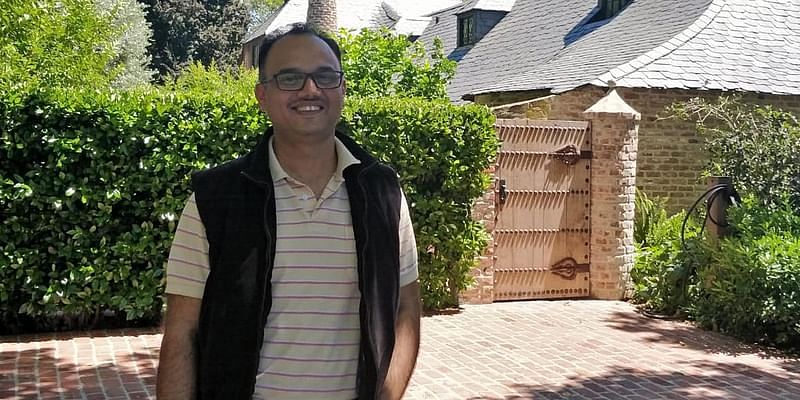As the Chief Strategy Officer at Bankit, a fintech company that is digitising banking in rural and semi-urban areas, Satyajeet Limaye spends his days innovating for the underbanked and unbanked using new technologies, design thinking, and more.
He has dabbled in Android-based mobile app development, web-based transaction technologies on ISO standards, as well as helped create 40,000 points of presence on the ground, integrated with technology at all ends.
But the techie and serial entrepreneur began his career over two decades ago, at a time when India was miles away from digitisation.
“[In those days], getting a peaceful hour of computer time during lab session was a challenge. Now, we laugh at those days,” says Satyajeet.
According to him, imagination is more important than knowledge when it comes to technology. Imagination, he explains, helps technology become incidental to building an organisation, paving the way for the future.
It all started with a radio
Growing up in a middle-class family in the pre-digital era, almost 50 years ago, Satyajeet’s life was, of course, quite different than it is today.
“When I was 10, my father bought a radio from the market and it was the most fascinating thing I had ever seen,” he recalls.
Curious, Satyajeet opened up the machine and tried to understand how it worked. He would go on to do this multiple times — mostly failing to put it back together.
During his summer break in Class XI, Satyajeet built an electric radio and the next year, he built and connected a water overflow alarm to it. Then, putting together a remote, he used it to control his grandparents’ lights using radio signals.
“This was the beginning of my journey to experiment, and discover new things,” he says.
Getting the first break
While he was pursuing a bachelor’s in electronics, Satyajeet fell in love with trekking. “During one of my quests in the Himalayas, I met a Pune-based industrialist, the owner of a capacitor manufacturing company,” he says.
The company was having trouble tackling its capacitor wastage. Satyajeet proposed using lasers to control the clip edge of the film, reducing the amount of waste. Later, he was offered an opportunity to work as an R&D engineer, and soon, ended up leading the company’s R&D.
“I was fortunate to get the right mentor at an early stage, which really helped in shaping up my passion, curiosity, and learning during that time,” he adds.
Taking success cues from books and mentors…
A voracious reader since childhood, Satyajeet’s turning point was a book gifted by his father during his MBA days — Maverick: The Success Story Behind the World’s Most Unusual Workplace, a business autobiography by Ricardo Semler.
“The book relates management succession and increasingly unorthodox ethos of Semco, which grew to become one of Brazil’s largest conglomerates,” says Satyajeet.
Coincidently, during his second year, a media report claimed that something similar was taking place in India. Satyajeet wrote to the company and got a three-month internship.
There, his mentor gave him Simplicity Wins: How Germany’s Mid-Sized Companies Succeed, a book written by a McKinsey consultant. Satyajeet was then asked to map the company’s practices using these two books.
“I stayed for five more months. I saw people from Japan coming to study their management practices. At that age, a hands-on experience like this was a blessing in disguise,” he adds.
After completing his MBA, Satyajeet decided to start his own company, implementing the principles he had learned. “I was full of energy, belief, and enthusiasm to start something with a value system in place, something ethically managed,” he says.
So, in April 1999, he started Info Dynamic Software Systems (IDSSPL), a software products and projects company aimed at EDI, electronic government compliance’s solutions. It was built ground up as a garage startup, to become one of the leading software provider in the banking industry for core banking software (CBS).
In 2002, he moved on to create Uptime Infratel, incubated with the same promoters as a diversification plan, to successfully diversify into telecom businesses and both companies worked with each other on projects both nationally and internationally. “There was a time when we were running operations and had a local presence in more than 10 countries globally,” he added.
Mobile — the tech for all
In 2004, in the course of running his company, Satyajeet happened to travel to the US, and became ‘mesmerised’ with the “mobile” device.
In India, the mobile phone was considered a luxury at the time, with mobile technology being at its nascent stage, and data, and network costs so high. But Satyajeet was confident.
“I believe that the mobile is going to be in everybody’s hand — professionals, students, or domestic workers,” he says.
So, in 2013 when 122 telecom licences got cancelled, Satyajeet lost more than half of his customer base. “We hired consultants to understand if telecom will survive and realised that its time we shift gears to mobile now,” he adds.
In 2014, he liquidated his company and started exploring the opportunities around mobile technology. This is what led to the foundation of Bankit in 2015
To develop the technology backend for the startup, Satyajeet spent weeks travelling around villages to observe how transactions took place, why people there used cash, and more.
In the next one year, everything changed with demonetisation, rollout of Aadhaar, the launch of Reliance Jio, which led to increased penetration of smartphones and the internet, changing the game altogether.
Adopting a fail-fast approach
For Satyajeet, failure has never been a barrier but has instead taught him to pivot to newer models professionally and see beyond the present.
“You can learn from books, people, and situations. Learning needs to be planned, deliberated, and done consciously. It doesn’t happen accidentally,” he explains.
This fail-fast is also the central theme of Bankit. The startup has been scaled using open-source technologies, a licence-light protocol model, and a fail-fast approach with internet pilots, market surveys, and gradually integrating partners to bridge the gaps found.
Today, Bankit is working on Java-based server applications, Android-based agent applications, cloud-hosted IMPS technologies, and white labelling of prepaid card programmes.
Under Satyajeet’s leadership, it has created several products that are used by thousands of its partners all over the country. These include small-ticket money transfers, micro loans, cash withdrawals using biometric verification using mobile and Aadhaar, among others.
The startup also provides customised prepaid cards that help digitise micro transactions that were earlier done through cash. Also, Bankit’s technology teams are currently enabling its mobile app and portal built for agents for vaccine appointments for their walk-in customers as well.
Satyajeet claims that 70 percent of the startup’s business comes from its mobile app today.
The way forward
“Digital currency is coming. Like no one stores music anymore — we stream it — soon, we will have money streaming technologies that will allow you to ‘streampay’ while you are watching. Most of your devices — cars, appliances, etc — will begin to pay on your behalf. We have so much to do and there’s so little time for all this and much more to happen,” he says.
Going forward, he believes that next-generation techies have to stick their neck out by never slowing down their learning pace.
“Technology is the flame of need. One should use technology to create more human connect. Listen to the voice of customer and use it as a driving force to build future technologies with more intuitive features,” he concludes.









